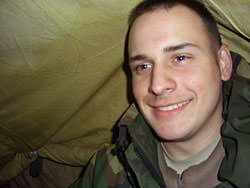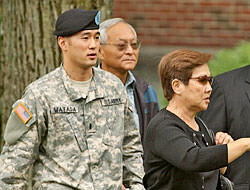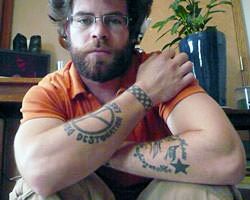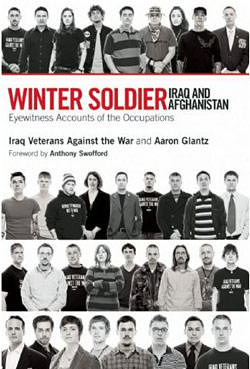
Judge bars retrial for Lt. Watada's refusal Marine "Benji" Lewis pledges
recall refusal Winter Soldier: Iraq and
Afghanistan "Where we
are at. An appeal for support"
Blake Ivey says "no" to Afghanistan deployment
"I believe war is the crime of our times," Blake Ivey, a specialist in the U.S. Army, said over the phone in a slow, deliberate voice. Ivey, currently stationed in Fort Gordon, Ga., is publicly refusing to deploy to Afghanistan. The 21-year-old soldier filed for conscientious objector status in July but was ordered to deploy while his application was being processed. He is determined not to go, and as of our last phone call, was still actively serving on his base, weighing his options for refusal. Ivey joins what appears to be a growing number of troops refusing to fight in the so-called Global War on Terror. While there is no way to tell the exact number of resisters, military statistics indicate that resistance is on the rise. Since 2002, the Army has court-martialed twice as many soldiers for desertion and other unauthorized absences per year than for each year between 1997 and 2001. The Associated Press reports AWOL rates in the Army at its highest since 1980, with the desertion rate (defined as 30 or more days of unauthorized absence) having jumped 80 percent since the start of the Iraq War. More than 150 soldiers have publicly refused to fight in the wars in Iraq and Afghanistan, and an estimated 200 war resisters are living in Canada. Many war resisters are conscientious objectors (C.O.s) who were deterred at early stages of the C.O. application process or ordered to deploy before their C.O. paperwork went through. Just last week, 19-year-old conscientious objector Tony Anderson at Fort Carson, Colo., publicly shared his experience. Anderson had been discouraged by his commanding officers from applying for C.O. status, and he disobeyed orders to deploy to Iraq. He now faces steep punishment at the hands of the military.
Judge bars retrial for Lt. Watada's refusal to deploy to Iraq
A federal judge said Tuesday that Lt. Erhen Watada cannot be retried on the most serious charges against him, because he is protected by the U.S. Constitution's ban on double jeopardy, the Associated Press reported.[1] Lt. Watada refused to deploy to Iraq in June 2006 on the grounds that the Iraq war is illegal, and his U.S. Army court-martial in February 2007 ended in a mistrial. Hal Bernton of the *Seattle Times* noted that Lt. Watada still works at Fort Lewis and is stuck in a "legal limbo" that will apparently continue for some time, since "[t]he judge kicked back to the military trial court for further consideration two other conduct unbecoming an officer charges against Watada, opening the door to further court proceedings. Both of those charges involve public interviews Watada gave to reporters, and were conditionally dismissed as part of a pretrial agreement. Settle said the military court should consider whether there are 'constitutional defects' to retrying Watada on those charges before a civil court does."[2] On Tuesday, one of Lt. Watada's attorney's, James Lobsenz, said: "We're happy, but it's too early to know what else might happen. It's highly likely (the Army) will appeal the judge's decision."[3] The *Honolulu Advertiser* reported that Bob Watada, a former Hawaii Campaign Spending Commission executive director who is Lt. Watada's father, fears that the Army might appeal the case all the way to the U.S. Supreme Court, but Eric Seitz, Watada's attorney in the February 2007 court-martial, told the paper that "theoretically, hypothetically [the other two charges] can be brought back, but I think there's going to be lots of problems. I don't think they can bring those back, either."[4] Seitz told the *Honolulu Star-Bulletin*: "They ought to let him resign. They aren't going to win this and they ought to acknowledge that."[5] Article with reference links...
Marine Benjamin Lewis pledges recall refusal
Marine Benjamin "Benji" Lewis served two tours in Iraq and was honorably discharged in 2007. Recently, he received notification that he was a candidate to be recalled to active duty. Last week at a Winter Soldier event in Portland, Oregon, Lewis publicly announced his intention to refuse reactivation from the Inactive Ready Reserve (IRR). Ten days before that event, Lewis spoke with Courage to Resist. Listen to Benji's interview...
Winter Soldier: Iraq and
Afghanistan:
“The only way this war is going to end is if the American people truly understand what we have done in their name.”—Kelly Dougherty, executive director of Iraq Veterans Against the War In spring 2008, inspired by the Vietnam-era Winter Soldier hearings, Iraq Veterans Against the War gathered veterans to expose war crimes in Afghanistan and Iraq. Here are the powerful words, images, and documents of this historic gathering, which show the reality of life in Afghanistan and Iraq. Iraq Veterans Against the War argues that well-publicized incidents of American brutality like the Abu Ghraib prison scandal and the massacre of an entire family of Iraqis in the town of Haditha are not the isolated incidents perpetrated by “a few bad apples,” as many politicians and military leaders have claimed. They are part of a pattern, the group says, of “an increasingly bloody occupation.” |

 Blake Ivey says "no" to Afghan deployment
Blake Ivey says "no" to Afghan deployment By Sarah Lazare, Courage to Resist for
By Sarah Lazare, Courage to Resist for  By Mark Jensen,
By Mark Jensen,  Audio interview by
Courage to Resist. October 27, 2008
Audio interview by
Courage to Resist. October 27, 2008 Available now from Courage to
Resist
Available now from Courage to
Resist